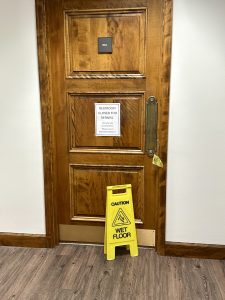In January 2020, President Grant Cornwell and Dr. Paul Reich, former president of faculty, reopened the 25-year-old discussion on reducing the required credit hours to graduate from 140 to 128. A Curricular Optimization Task Force was enlisted to review the undergraduate curriculum requirements.
Reich, chairman of the committee, said that members of the faculty were experiencing pressure on the schedule due to fewer instructors in academic departments and many courses to teach.
“We found that the change in curriculum was not going to affect learning outcomes for students. We did a lot of soul-searching, but could not find a real pedagogical reason for remaining at 140,” Reich said.
The number of credit hours required to graduate from Rollins’ benchmark schools (i.e. Rhodes College, Emerson College, Furman University, Macalester College) averages 128 credit hours or less with four-credit courses.
“It’s not necessary that we, at Rollins, do what other private liberal arts colleges are doing, but if we do something outside of the norm, we should have a clear reason why,” Cornwell said.
“It is not the will of the faculty to move in the direction of the 128 credits in this particular moment, without having a bigger picture of the range of implications that such a decision presents,” said Dr. Jana Mathews, chair of English and current Faculty president.
“The change was only tentatively discussed, but the responses to it really had us take a step back, so the issue isn’t dead, but it’s definitely been put on hold until the end of the year,” said Mathews. “Since it’s such a big deal, we as a faculty want to make sure that if we support and endorse the decision, we know how the chips are going to fall.”
Members of the committee presented their findings to each of the academic divisions independently. They have also been in contact with administration regarding the financial ramifications of the decision, and consulted with student representatives regarding the academic consequences of the decision, such as President of the Student Government Association (SGA) Daniel Elliot (‘23).
Reich said that the committee is in the process of extended course scheduling, or planning the distribution of courses three years in advance instead of one.
“We’d rather have 16 students in a class every other year than less than seven every semester, which limits the diversity of thought represented in discussions,” Reich said. “There won’t be dramatic changes on the course caps, though, because we don’t want to change the essential nature of what Rollins is: a tight-knit community. Within a major, though, the scheduling and moving around of courses means that students would have to be more intentional about their planning choices.”
Reed Andary (‘22) said that he does not enjoy the abundance of general education and rFLA requirements, as he has a deep interest in prioritizing courses that relate directly to his major, social entrepreneurship.
“The number of credit hours required are a lot,” Andary said. “That being said, the first couple of semesters allowed me to really explore my interests, and I would potentially have been a music major as well if time were to permit. In terms of course caps and class sizes, I will say that that’s something I hope doesn’t change for students at all, because it’s one of the reasons I came to Rollins.”
The average number of credit hours required to graduate per major ranges from 46 to 52, while certain majors require significantly more, such as international business (68), business management (64), chemistry (60), social entrepreneurship (60), and mathematics (56).
Reich said, “At a liberal arts college like ours, having that many credit hours in one discipline seems excessive and doesn’t meet our ethos, especially when our peer and aspirant schools are able to deliver their curriculum without facing the same challenge.”
Rhodes College’s business major requires 46 credit hours, and Macalester College’s mathematics major requires 44 credit hours.
Mark Anderson, chair of Mathematics, said, “I’m not particularly in favour of the 128 credit hour requirement to graduate, as most students are well over the 140 credit hour requirement, and this decision is seeking to accommodate those who fail some classes. I wouldn’t be averse to removing the computer science core requirements and maybe an elective, though — it’s not going to compromise the integrity of the major.”
Reich said that the cost of attendance at Rollins leads to some students attempting to graduate early in order to save money.
“There are a number of students that come here and want the four-year college experience,” Reich said. “The committee and administration doesn’t expect there to be a significant increase in those that are graduating early as a result of this change.”
Mathews said that many students come in with AP, IB, and dual enrollment AA credits, so there are questions being raised regarding the amount of time that a student must spend at Rollins to earn a degree, among others.
“We recognize that college is expensive, that students do all this work in advance of coming here and we want to be able to reward and acknowledge that,” Mathews said. “We do, however, also want to preserve the integrity of the Rollins degree, make sure that we can deliver on our educational mission and stay true to the liberal arts. I get it, though; I graduated from a four-year degree-granting college in less than two years, so I am really mindful of the needs of students. […] It’s where those credit hours are potentially going to be reduced from that seems ideologically problematic to the faculty.”
The committee recommended increasing the number of elective credit hours from 16 to 20, which is now a point of concern to the larger majors, who want to preserve the integrity of their disciplines. The business department declined to comment.
“There are certainly people that are not happy about [lowering the credit hour requirement], is what I’ve gathered from the division meetings I’ve been to. Change is hard, and anytime it’s discussed, it becomes problematic, but I think a lot of questions regarding this decision involve budgeting and staffing,” Reich said.
While students in the science department must take lab classes that offer two extra credits, and international business students must complete an accredited internship to graduate, “every other student typically has to find other ways in which to fulfill our graduation requirements,” Reich said.
Winter Intersession is a means for students to fulfil their graduation requirements as a single week-long pass/fail-graded course. However, with COVID-19, intersession course prices increased from free to $500-$1,000.
Mathews said, “I am very concerned about the fact that we now charge tuition for intersession. It’s a great opportunity for students to explore and not only see it as free credit, but have the chance to take a class in something that they might not otherwise. […] Last year I saw their enrollments drop pretty dramatically.”
Jack Kelly (‘25) said, “I think that the liberal arts program has an immense benefit to a lot of students, but it must be made more affordable, accessible, and equitable.”
The tentative decision to reduce the credit hours required to graduate from 140 to 128 is being deliberated by all departments and stakeholders on campus.
Cornwell said, “I’m very confident that the best preparation for our global market is a liberal arts education […] So many times, students come into college thinking that they want to major in something, and through the core curriculum exploration, realize that the methodology and questions being raised by another entirely different field are much more interesting. So, it’s that process of discovery through which students come to understand and learn more about their skills, abilities, and passions.”







[…] however, excitedly reported that the curriculum committee met on Jan. 31 to approve the ability for the more faculty to be hired with the ability to work […]